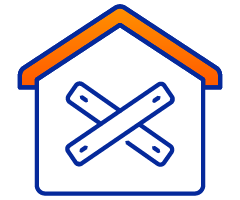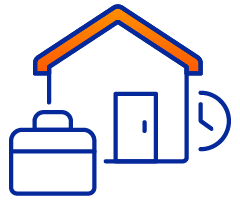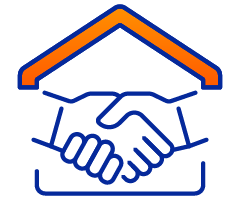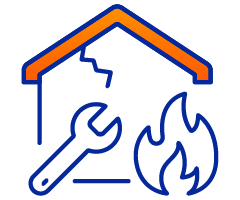Start Here
Homepage Bottom Form
We will get back to you as soon as possible.
Please try again later.
How to Talk to Friends and Family After a House Fire
💬 How to Talk to Friends and Family About What You Need After a House Fire
Created by House Fire Solutions – Helping You Recover, Rebuild, and Be Heard
After a fire, people want to help — but they don’t always know how. You might feel torn between needing support and not wanting to burden others. This guide helps you communicate your needs clearly and confidently, set boundaries, and build a recovery network that actually helps.
❤️ 1. Understand That It’s Okay to Need Help
Accepting help is not weakness — it’s strength.
- Remind yourself: “I’m going through something extraordinary. It’s okay to lean on others.”
- You don’t need to “stay strong” all the time — recovery takes community.
- Friends and family want to help but often wait for guidance.
- Think of it like a team effort — you’re the one organizing, not burdening.
- Reframe asking for help as giving others a meaningful role in your healing.
💡 Tip: The more specific you are about what you need, the more helpful others can be.
🗣️ 2. Identify What Kind of Support You Actually Need
Before you talk to people, make a list of what would truly help you right now.
Common categories:
- Emotional support: Someone to listen, check in, or just sit with you.
- Physical support: Help packing, cleaning, or moving belongings.
- Financial support: Temporary housing costs, clothes, pet care, or meals.
- Information support: Guidance on insurance, paperwork, or recovery steps.
- Child or pet care: Trusted help so you can handle logistics.
- Practical errands: Grocery runs, rides, or appointments.
💡 Pro Tip: Write your needs down — seeing them on paper makes it easier to express them clearly.
🧭 3. Choose Who to Ask for What
Different people can offer different types of help — and that’s okay.
- Close friends may offer emotional support and daily check-ins.
- Family might help with logistics, housing, or finances.
- Neighbors or community groups might offer practical aid.
- Coworkers may donate PTO or organize fundraisers.
- Faith or community leaders can help with counseling or resources.
💡 Tip: Assign roles — like “meal organizer,” “insurance helper,” or “kids’ support.” It makes people feel useful and reduces repeated questions.
💬 4. How to Ask for Help (Without Feeling Awkward)
Here are simple, natural scripts you can use — adjust as needed:
🏠 Emotional help
“This has been really hard. I don’t always know what to say, but I’d really appreciate just having someone to talk to.”
🍲 Practical help
“Would you mind helping me with dinner one night this week or bringing some groceries? It would take a huge weight off.”
💵 Financial help
“Our insurance is still being processed, and things are tight. If you’d like to help, here’s the link to our fund / gift card we’re using for essentials.”
🧺 Task help
“We’re sorting through salvageable items this weekend — if you can come for an hour or two, that’d be amazing.”
💕 Gentle boundary
“Thank you so much for checking in — I really appreciate it. I’m still processing things, but I’ll reach out soon.”
💡 Pro Tip: You don’t have to share details of your loss every time. It’s okay to keep conversations short and kind.
💞 5. Set Emotional Boundaries
Even people with good intentions can overwhelm you.
- It’s okay to say “not right now” or “I appreciate it, but I need some quiet time.”
- Avoid conversations that feel draining or intrusive.
- Let someone else handle updates — assign a trusted friend to share info with others.
- Turn off notifications if texts or calls get overwhelming.
- Protect your peace — recovery is not a social obligation.
💡 Tip: You can love people and still say “no.” Boundaries protect your healing space.
📱 6. Create One Clear Way to Share Updates
Instead of repeating your story multiple times, simplify communication.
- Create a private Facebook group, CaringBridge, or group chat.
- Post updates like: “Insurance inspection done. Temporary housing arranged. Thanks for your support — we’re hanging in there.”
- Let others share offers of help in comments — it creates a community response.
- This reduces emotional exhaustion and keeps friends informed.
💡 Pro Tip: Choose one family member or friend as your “communication helper.”
🧾 7. Use Lists or Apps to Coordinate Help
Make it easy for people to take action without confusion.
- Use tools like Meal Train, SignUpGenius, or Google Sheets.
- Create categories for meals, errands, transportation, or pet care.
- Update needs weekly as your recovery changes.
- People feel better helping when they see exactly what’s needed.
💡 Tip: Avoid vague requests like “We’re okay for now” — it makes people uncertain. Be clear and grateful instead.
🙏 8. How to Receive Help Graciously
If you’re used to being independent, accepting help might feel uncomfortable.
- Remember: letting people help is a gift to them too.
- Say thank you — but don’t apologize for needing assistance.
- You don’t need to repay kindness right away — you can “pay it forward” later.
- Express gratitude through updates, photos, or small gestures.
- A simple message like “Your help made this week easier” means a lot.
💡 Pro Tip: Write down names of people who’ve helped — you’ll appreciate remembering them later.
💡 9. Dealing With Unhelpful Comments or Questions
Sometimes people mean well but say the wrong thing.
Here’s how to respond without adding stress:
- “I appreciate your concern. We’re focusing on next steps right now.”
- “That’s a tough question — I’m not ready to talk about that yet.”
- “Thank you for thinking of us. We’re still figuring things out.”
- If someone offers unwanted advice, say: “Thanks for the suggestion — I’ll keep that in mind.”
💡 Tip: You can redirect a conversation anytime. You don’t owe anyone your trauma story.
💪 10. Remember That Support Evolves Over Time
People show up early, then fade — it’s normal.
- Reconnect with a few close friends as long-term supporters.
- Ask for check-ins during milestones (move-in day, claim approval, etc.).
- Join local fire recovery or grief support groups for ongoing encouragement.
- Keep sharing how people can still help months later — it’s okay to ask again.
💡 Pro Tip: Real recovery takes time — teach your support network how to stay consistent.
🕊️ 11. How to Offer Support Back (When You’re Ready)
When your own strength returns, you’ll naturally want to give back.
- Send thank-you notes or small tokens later.
- Volunteer with local fire recovery networks.
- Support others going through loss — you’ll bring empathy they’ll trust.
- Share your story to inspire or educate others.
- Celebrate your community’s kindness — it reminds everyone what matters most.
💡 Tip: Giving back can be one of the most healing parts of your journey.
💬 12. A Gentle Script for Yourself
“I am allowed to ask for help.
I am allowed to rest.
I am allowed to say no.
I am allowed to heal at my own pace.
And the people who love me will understand.”
Our Team Helps You Navigate Insurance, Restoration, and Rebuilding
It is a long established fact that a reader will be distracted by the readable content of a page when looking at its layout.

Board-Up
Our Network of Board Up Specialist Will Secure your property fast

Temp Housing
We'll Help You Find Safe Shelter while you recover

Public Adjusters
Our Network of Fire Damage Adjusters Will Fight Help for a fair insurance payout

Investors
Our Partner Specializes in Buying Fire Damaged Homes So you Can Sell your home as-is

Content Cleaning
Restore what matters most

Restoration
Bring your home back to life

Attorneys
We have a network of Protect your rights and claims

Mental Health
Support for you and your family
Want To See If We Can Help You
If you'd like to speak with us today about purchasing Social Security, Personal Injury, Workers' Compensation or Employment Law Leads.
Homepage Bottom Form
We will get back to you as soon as possible.
Please try again later.